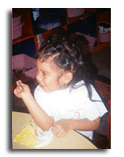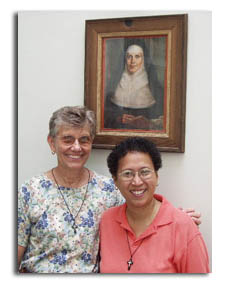
MUCEC is a non-profit charity supporting distressed women in Colon, Panama. Donations are tax deductible in Panama and the United States.

If you want to know more about how you can help a deserving child in Colon, please click here .
|
about us | |
| testimonials | |
| support us | |
| volunteers |
take me home
Sisters of Mercy in Colon |
||||||
|
| ||||||
|
Born in Brooklyn, New York, Sister Barbara Ozelski arrived to Panama in 1964 after her university studies to serve as an educator and to help patients infected with leprosy in the “Palo Seco” hospital. From 1971 to 1985 she worked in the mountains of Volcan, Chiriqui in the creation of leaders and the Ecclesiastic base communities. Sister Barbara's pastoral mission of helping the unemployed and abused women in Colon commenced in June of 1985 and continues to this day. Sister Barbara is presently the Administrator of the MUCEC center in Colon. e-mail: barbara@mucec.org |
Born in Colon, Republic of Panama Sister Dina Altamiranda, worked as an educator and served in the Panamanian education system for more than 12 years. Sister Dina collaborated in the formation of catechists and parochial leaders in the city of Colon from 1978 to 1995. Since 1985 she has been working closely with Sister Barbara to help Colon's abused women and their children in the MUCEC center. In 1988 Sister Dina was accepted into the Sisters of Mercy order. Presently she works as the psychologist and programs director at MUCEC center.
| |||||
|
|
||
|
"Yes we can!" MUCEC began in 1985 with efforts to help some of the poorest of Colon’s impoverished inhabitants -- the abused women and their children with little or no income. Unlike other programs, MUCEC seeks a permanent solution rather than a temporary fix of the problem via a handout. Thus, MUCEC each woman is treated according to her various levels of need. Attendance at weekly formation sessions is obligatory, and these meetings deal with relevant themes suggested by the women themselves: mental and physical health, hygiene, family relations, domestic violence, political and human rights issues, as well as monthly Faith and Reality Sessions. Secondly, skill development workshops create both economic possibilities and also a sense of accomplishment previously unknown to most of these oppressed and battered women. Thirdly, skills are implemented in communal production with an emphasis on feminine solidarity. Whether or not they actually “produce” a final product, the women learn to work together and share responsibility. Additionally, related programs provide formation and education for their children. Under the miserable conditions in parts of Colon, Panama, where the unemployment is currently 56%, jobs, when available, are low-paying and insecure, housing conditions are deplorable (over 27,000 people live in condemned housing), and 58% of families are single mother families – progress is slow, and change even slower. Change does, however, occur. We have witnessed repeatedly violated, humiliated and oppressed women find shreds of human dignity from which to build new lives and to grow. We have seen the malnourished children of these women learn to read or just to say “thank you”. Once launched, the empowering search for self-respect and human dignity is not easily lost. Hence, after years of slow, painful struggle, and almost constant evaluation, our prospects are stronger than ever, and our motto remains “Si podemos” – “Yes we can”. |
home | about us | testimonials | support us | volunteers
Copyright ©2002 MUCEC.org postal code 0301-00247 TEL: (507) 447-0828 Fax: (507) 447-1820


